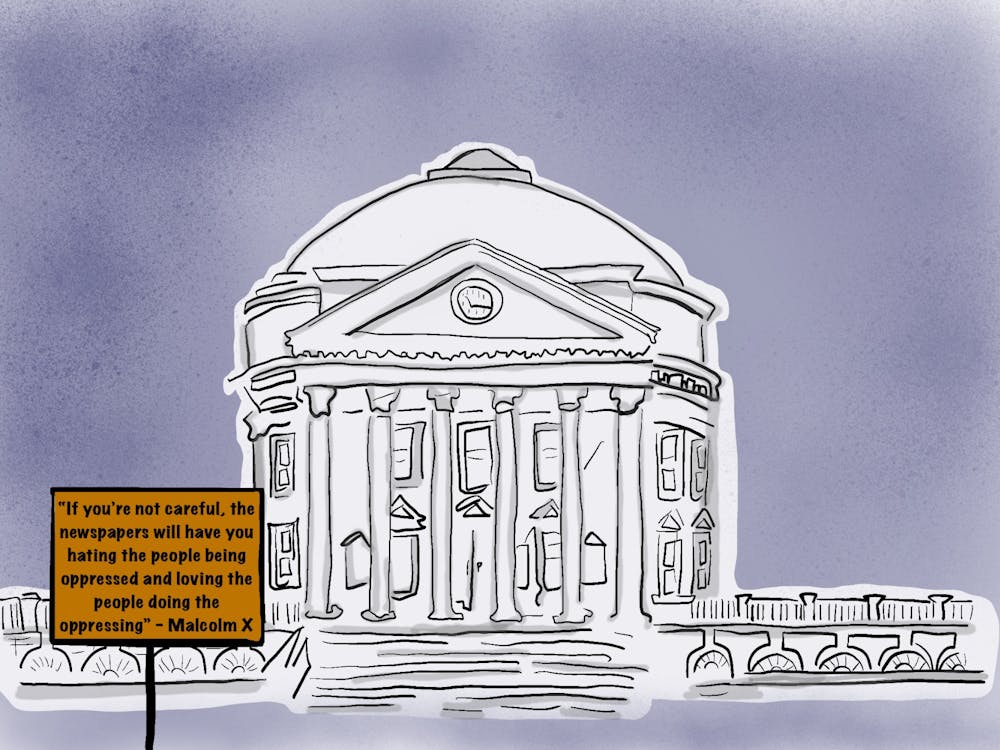Last week the Managing Board wrote about the dangers of allowing “radical speakers” to lecture on university campuses. They cited the recent case of Missouri State University’s religious studies instructor, David Embree, who invited now-murder-suspect, Frazier Glenn Miller Jr. — born Frazier Glenn Cross Jr. — to speak to his class two years ago. Cross, a former leader in the Ku Klux Klan, spoke to Embree’s students and shared his strongly bigoted views.
The Managing Board’s opinion was that students who listen to the vitriol of extremist speakers in an academic environment may feel “uncomfortable or intimidated,” which would “likely dissuade students from contributing to the class discussion.”
However, I would disagree. Try to remember back to last week when members of a radical religious sect, similar to the Westboro Baptist Church, came to Grounds. Though uninvited, they spoke to students at the University and preached their personal views, which were homophobic, anti-Greek life and offensive to many. But did University students cower at or fear these hate-spreading people? Were they “dissuaded” from discussion? No. University students engaged these people and debated with them.
The Managing Board wrote that “minority groups” who were targeted would especially be deterred from participating in discussion. Yet, some of those specifically being attacked — in this case gay students — were bold and questioned the religious radicals; they even kissed their partners publically to prove they were not “intimidated” by the speakers.
The Managing Board has little faith in our student body, and students at other universities, if they believe us to be so sensitive and impressionable that we cannot handle radical speakers. In a column posted just two weeks ago, my fellow columnist Forrest Brown wrote about the protest incident, “Students did not allow themselves to be baited into making bad decisions.” It is obvious that University students are not only able to listen to radical speakers without “making bad decisions,” but they can also formulate thoughtful and intelligent rebuttal, even in the case of an unstructured protest — something far more dangerous and intimidating than an in-class lecture. I say more intimidating because there are no boundaries in a protest setting, as there would be in an academic environment.
I am not saying that anyone at any time should come to our school and preach their personal, hateful views. A speaker who represents no ideology and who just spews unfounded hatred should not be welcomed in a University setting. However, if their ideologies are grounded in something other than their own personal opinions — for example, if they support their opinions with history, facts, religious scripture or science — then what they have to say is worth hearing. Additionally, if we want to provide a legitimate forum for engaging ideas, one that cultivates an atmosphere of genuine intellectual discourse, universities are the optimal place to do so. I used the example of the religious radicals in the Amphitheater solely to show the ability of our student body to respond. However, I do not believe an unstructured, outdoor protest is the best way to present these difficult topics. Holding these lectures formally and in classrooms will create a structure which provides a platform for both the speaker’s ideas and our own. We are going to be exposed to these offensive opinions at some point in our lives, so why not be introduced to them now, in a relatively safe and controlled university setting?
According to the Guardian, a report from a working group on academic freedom says extremists should be allowed to speak at college campuses because, “Unless views can be expressed they cannot also be challenged.” Similarly, Nicola Dandridge, chief executive of the Universities UK, said “External speakers play an important role in university life, not least in terms of encouraging students to think for themselves, challenge other people’s views and develop their own opinions.” It is easy to just say “this group hates these people and they are wrong for it” and to avoid confrontation. But what will that accomplish? We cannot promote this idea that distancing ourselves from the problem will solve it — that is exactly what is keeping us from changing anything.
So bring on the confrontation and bring on the radical speakers. Let us learn about their reasoning, engage in conversation, and then share and reinforce what we believe through debate. There is no proof that this will change the radicals’ opinions, but — rather than ignoring bigoted speakers or prohibiting them from speaking at college campuses — it may be the best way to persuade such speakers to see the other side of the issue. It also provides students the opportunity to understand the reasoning of such people and disagree with it intelligently.
One of the main points of the Managing Board was that “bringing speakers who promote violence along with radical agendas to classroom risks student safety.” In this case, University officials should use their discretion. If University officials are worried about the potential for danger or public disorder as a result of a speech, that is one thing. If the most probable harm a radical speaker could do is offend the audience with their vitriol — that is completely different. College is a time to be immersed in these challenging topics and to do things that are out of your comfort zone, and nothing is more challenging than confronting these difficult issues head-on.
Meredith Berger is an Opinion Columnist for The Cavalier Daily. She can be reached at m.berger@cavalierdaily.com.




